Blogging may be good for your health,
or so say researchers. I suppose so, but I would place it under the larger rubric of (semi-)creative forms of self-expression, which are, I've read in many places, psychologically good for you. Blogging is an expressive media that also happens to be public. (Are there still blogs that can only be read by the blogger?) I do know that in past years, before my university duties and responsibilities began to increase to the point that my ability to type even perfunctory entries here decreased to silence, I found even toss-off blog posts quite therapeutic and very enjoyable. In many cases, it's the only place I can, well, download the crap that's in my head (other than dropping it on C or friends whom I unfortunately see only infrequently these days.)
Adrian Piper floating across the surface of my consciousness? (She really is, I kid you not.) Blog it. A translation I attempted? Blog it. My visit to the
Santo Domingo Book Fair, which was both thrilling and terrifying, because I did not have
Señor Montgomery, who can rattle off Spanish adroitly enough to make a real estate agent take pause, by my side, so I had to get by on my own, twice--and was able to manage okay? Blog it. Every so often I will be Googling something...not usual, let's put it that way, and J's Theater will turn up. Not a pat on the back, but just to say that I do like that some of what happens here, or used to happen here, will be available to the wider world. Certainly the idea of conversation, one of my great dreams in life--not the dream of an "audience," in
Theresa Cha's terms, or a "common language," in
Adrienne Rich's, though both are quite important but quite unlikely, at least in the standard terms both are often posed--but of a conversation, which is what I envisioned the literary world to be like, university life to be like, life to be like, though all have turned out to be really something quite different, at least has the possibility of occurring here. There are no hierarchies, everybody, including the creepy ad-bots who occasionally figure out how to sign in, even have their turn. I haven't had any hardcore ranters, like the pro-Bush zombie who posted several years ago, though, in a long time.
+++

I would love to meet
Joan Houlihan over coffee. (Does she really exist, or is there a committee that writes in her name?) I imagine we wouldn't agree on much, but she does have a way with her reviews. I read
this one on Matthea Harvey's recent book, Modern Life (Graywolf, 2007), and it got me to thinking about something I've been rolling around in my head for a while, so here are a few simplistic and not very coherent thoughts which I hope someone will respond to.
Houlihan critiques Harvey's book as a work of "poetry," and finds it wanting. While she notes that it does possess, in formal, modal, technical, rhetorical, figurative and discursive terms, key aspects of what we would define as poetry--though it is falls into none of the traditional poetic genres, which is to say, it is neither lyrical, narrative, epic, comic, etc.--the individual poems and the book as whole lack what I read Houlihan suggests as sufficient tonal variation and a concomitant trajectory, a movement towards something, a telos that, even if not reached, might somehow endow the poems with that poetic purposiveness (even if, in Kantian fashion, without purpose), that critics and readers of poetry, as well as poets themselves,
expect of poems. Even in the wake of Language Poetry's several generations of poetic practice, where the expectations of trad poetry were called into question on political, ideological, and theoretical grounds, and in so many cases, for good reasons, those expectations have not dissipated, at least not fully, and certainly not for a critic like Houlihan--or for a great many poetry critics, teachers, poets, and students.
Nevertheless, she says that Harvey's book, even if it fails her test as a work of poetry, could be read as a work of "conceptual art." And it is this suggestion that particularly fascinates me, because, I noted to Chris Stackhouse some time ago, apropos of Kenneth Goldsmith's work, that while it may fail (or fail to qualify, under certain critics' views, including even Goldsmith himself) as poetry--Houlihan cites Goldsmith as an exemplar of what she's designating as the
ne plus ultra of this type of contemporary "poetry"--it struck me then as now that, instead of defending his work as poetry, he should simply call it conceptual art, or place it within that broader rubric, and be done with it. Cover all bases at once, and proudly stand beside, say,
Vito Acconci or Lawrence Weiner. Are they not also poets, or rather, what happens if we think of them in this way? (I feel the same way about the poetic production of, say,
Cecil Taylor and
Sun Ra, but I'll leave that to
Aldon Nielsen, Nahum Chandler, and
Fred Moten, among others, to argue.) There are all sorts of issues and questions that arise, of course, if one decides to do this, and Goldsmith was blogging on the
Poetry Foundation's website for a while, perhaps getting paid to do so or not, but ultimately, as Goldsmith described his work himself, it appeared to be more a conceptual project--which does not cancel it out as poetry, since all poetry, and all art, can at some level be classified as proceeding from a concept or concepts, even if
a posteriori--than poetry, though under broad definitions (institutionally legimated ones, since Goldsmith writes and teaches at various prestigious institutions, I'm told) it certainly qualifies.
This got me thinking about my class discussion several weeks ago of
Theresa Hak Kyung Cha's remarkable
Dictée, and my appeal to the class to consider it not only as a work that crossed and eluded genres, as a text of American literature (as well as many others), but also as
a conceptual project. A successful one that could also, I feel, be read as a work of poetry, or even fiction or (auto)biography, if such terms are necessary. Cha (1951-1982) was a practicing conceptual artist who came of age and studied with a number of major figures at Berkeley and in Paris in the early 1970s. Sculpture, film studies, conceptual art practice, and the range of structuralist and post-structuralist theoretical interventions all factor into her rich but brief artistic career, out of which
Dictée appears. This particular work, I feel, arises out of conceptual play, out of concepts that Cha was puzzling over, trying to understand and resolve, playing with, throughout her career, and in this particular text, they cohere in a marvelous way such that the reader cannot but be struck by the way that conceptual exploration unfolds, blossoms, into narrative that isn't developmental, but associative, that, in post-modernist fashion, results in an artifact whose very form and content resist closure, and press endlessly towards process, towards ideas whose formulation, whose understanding, whose coherence requires the active participation of the reader/viewer. The concepts behind
Dictée, however, are quite evident. Yet it works as both a conceptual art project, and as a work of, among other things, poetry.
This line of thought calls forth a wide array of works that, especially in the history of modernism and modernist literature (and thus post-modernism and post-modernist literature), both tidily fall into place as acclaimed (or ignored, say) works of poetry, but also could be reread as conceptual art projects. So for example, what if we consider
Gertrude Stein's
Tender Buttons, a work that I first encountered as a student in
Joel Porte's class back in 1983 or 1984, with utter bewilderment and fascination, a work that recall reading and rereading over and over until I was in a spell, which made me want to understand not only what the texts meant and the intent and motivations (those bad words in English studies) behind it, but its governing concept or concepts (which Harryette Mullen rethinks and transforms so powerfully in
Trimmings), and which, when I taught it this year, had a similar effect (including terror) in (many of) my students? Isn't
Tender Buttons, in addition to being a landmark work of poetic production, also a conceptual art project, and overtly so? And what happens if we read the work in this way? Are we really going against Stein's grain? Because since her conceptual framework entails a writing of the object that entails and requires engagement along the lines of Cubism--simultaneity, fragment, juxtaposition, rupture of field and ground, abstraction, etc.--and derives meaning from this conceptualization, and from the conceptualization of poetry as a modernist, anti-patriarchal practice, among others, in fact, really takes on meaning in light of this conceptual understanding, isn't it almost necessary to start from the standpoint of
Tender Buttons as poetry and conceptual art, especially if none of the biographical and historical underpinnings of the work are immediately known to us, and if we do not have other theoretical prisms, such as feminist theory, queer theory, psychoanalytic theory, deconstruction, etc., all of which are important to understanding the work, at hand?

The concepts in
Tender Buttons are immediately in play. Certainly one can use all the tools of poetry to read and grasp a great deal of this work, and yet in some key ways, they fail the reader. This is what Houlihan, I think, is arguing about Harvey's work. But when we also view
Tender Buttons as a conceptual artwork--or perhaps if the limitations of conceptual art are too great, something along these lines--then we have yet another way of reading and understanding what might to some critics fall outside the boundaries of what is understood, at least in common parlance, to be poetry.
I take it that Houlihan does not find this additional category useful within the context of poetry criticism or the constitutive body of poetic practice today. It is literally something else. And should be recognized as such. But to me it seems to be a very useful way of thinking about certain works, certain poets and poetries, certain geneologies, that fall outside the official confines that the poetry hierarchies consecrate and canonize. Stein is in the canon; but what about a writer like
Russell Atkins, whose entire poetic project, especially his daring work of the 1950s and 1960s, is deeply conceptual? Nielsen has written about Atkins, so he is not really outside the lines, but he, like
Norman Pritchard, for example, can also be understood productively, I think, if the notion of the concept and the conceptual is brought to bear. I guess I should not understate the questions such a categorical shift or reassignment, or trans-status, represents and presses. What are they? What happens when one thinks in terms of both/and as opposed to either/or, especially with regard to distinct genres and art forms? How does it help the artist? Or does it? Does she end up between the cracks, in the interstices, in an overlooked, if productive, third space. Who is empowered to read, to criticize, to legitimate?
One issue that Houlihan does not broach per se is that in some contemporary poetic works, the "concept" or conceptualizations are so effective hidden, interwoven, buried, nested, the source texts so carefully veiled or hooded, the various intertexts so subtly put into play, that unlike most art world conceptual art--think of the artists I mention above, or, say,
Daniel Buren, for example, or
William Pope.L (above right, U. Michigan School of Art and Design), or
Marina Abramovic, or even writers whose works (or at least some of them) could be reclassified as also being overtly conceptual, such as
Wilson Harris, Diamela Eltit, John Ashbery, Werewere Liking, Alexander Kluge--the concept or concepts in play are hard to grasp, except without considerable effort. Houlihan, it appears, may be interested in that effort, but it appears that she wished Harvey had made taken more of a step towards some of the conventions of "poetry" that might afford critics and readers like her greater means of understanding, exploring, enjoying the work. Or perhaps the concept or concepts could have been more overtly foregrounded. What do you think?







 My sincerest condolences to the family, close friends, colleagues, and students of
My sincerest condolences to the family, close friends, colleagues, and students of 








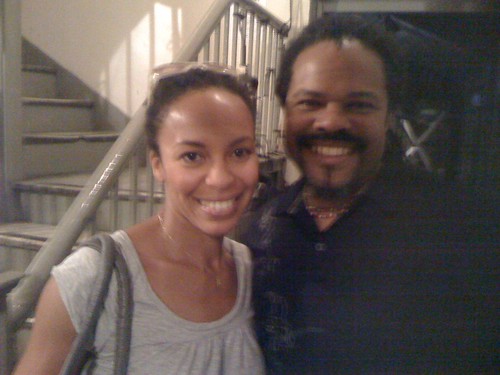



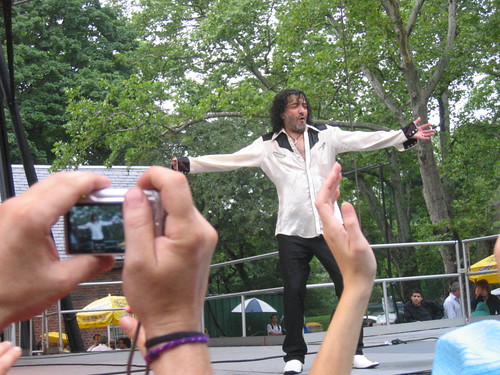

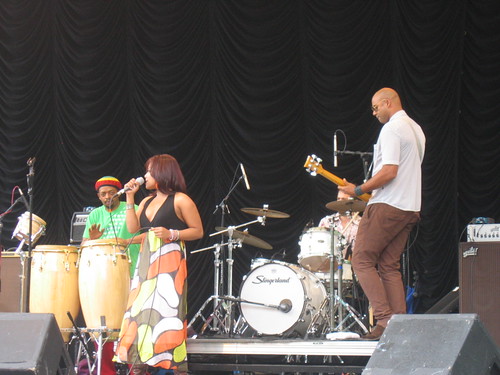
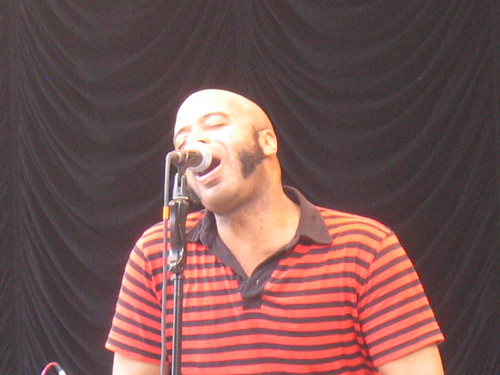
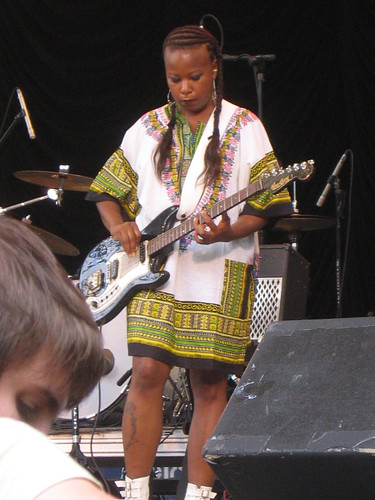

















 And now for one of the hugest debacles of the baseball season:
And now for one of the hugest debacles of the baseball season: 

 It's official, extraordinary and still somewhat unbelievable to me. Whatever you feel about marriage as an institution (I personally have always been somewhat of a skeptic),
It's official, extraordinary and still somewhat unbelievable to me. Whatever you feel about marriage as an institution (I personally have always been somewhat of a skeptic),  I would love to meet
I would love to meet  The concepts in
The concepts in 






